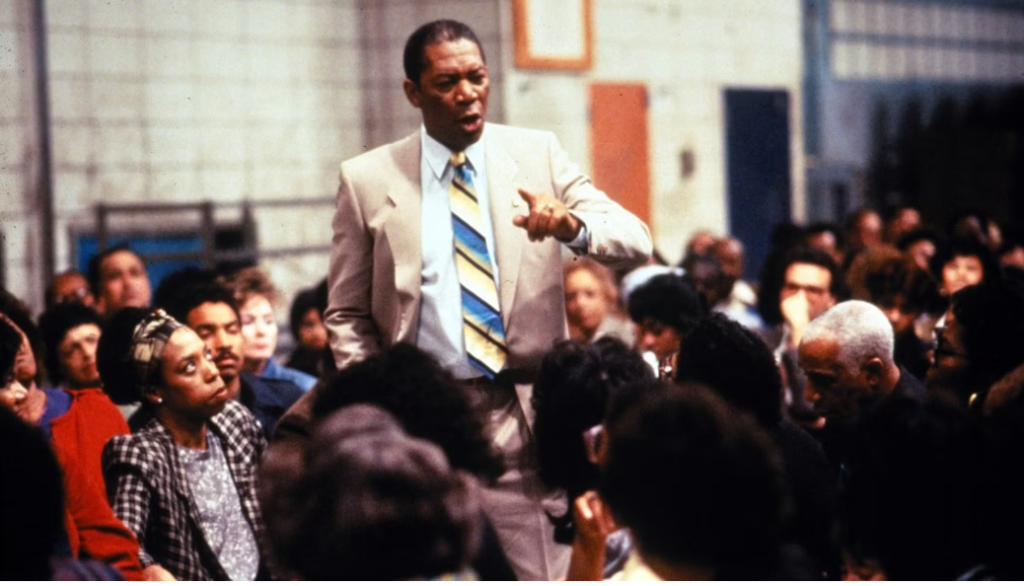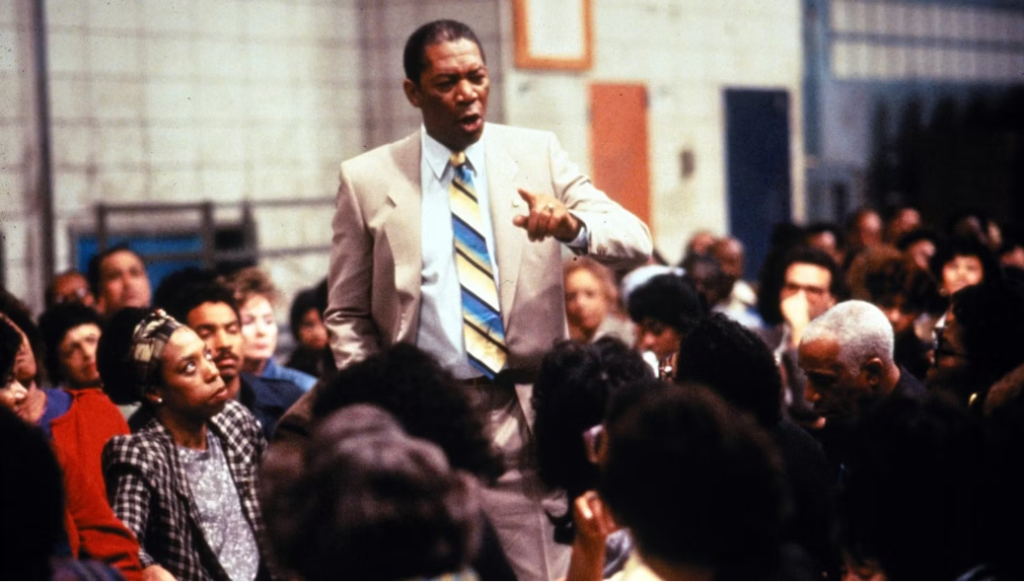Imagine being a high school student. You’re at the crossroads of your teenage years, and every morning, you wake up early to catch the bus and get one step closer to getting your diploma. The school you attend is set up like many others across the country but with one notable difference. The halls are covered with graffiti. Drug dealing is conducted out in the open, and rampant violence is found everywhere. This was the situation at East Side High in Patterson, New Jersey until principal Joe Clark came in to make a difference.The story of the crusade to turn around East Side High was brought to life in the 1989 film Lean on Me, in which Clark was portrayed by Morgan Freeman. A principal going to war with a high school that resembled a dystopian wasteland armed with a bullhorn, a baseball bat, and an impressive vocabulary might have seemed far-fetched. However, for East Side High and its students who were in a state of turmoil, this is exactly what transpired. Morgan Freeman’s portrayal in Lean on Me isn’t just one that’s true to life; it’s one of a determined individual to turn the tide against insurmountable odds and clean up a school.
One Man on a Mission for Change

Capturing the story of Joe Clark’s arduous task, Lean on Me immediately establishes the disarray and degeneration that plagued East Side High. The imagery depicting the chaos of gangs, assaults, and drug dealers set to “Welcome to the Jungle” by Guns ‘n’ Roses establishes a direct link with East Side High and the song’s content. Lyrical passages such as “You learn to live like an animal in the jungle where we play,” set against the scenes of drugs and violence, equate East Side High to an urban war zone.
Clark’s arrival as the new principal is met with immediate disdain from some of the student body, most notably the 300 students whom Clark expelled in real life. Clark’s mission to turn around the school and expel the dissidents who peddled narcotics and brought violence against the students and even teachers was considered a radical move by some. To Joe Clark, it was a necessary maneuver to begin the rebuilding process.
Complex, Comprehensive, and Controversial

Morgan Freeman perfectly captures an aspect of the educator that was certainly true in life: the polarization among critics regarding his disciplinary measures. To say that Clark was a controversial figure would be an understatement. His tenure as the principal of East Side High, a position he would hold until 1991, was praised by some and criticized by others. Lean on Me doesn’t shy away from the battle that Clark waged as principal. In fact, it depicts it with a sort of brutal honesty that doesn’t attempt to sugarcoat the famous educator’s controversial reputation.
It wasn’t just the delinquent students that Joe Clark went up against in his struggle to turn things around. The school board, outraged parents, his own teachers, and even several figures in the area of public safety found an adversary in Clark that they found difficult to handle. Many of the interviews with the real-life Joe Clark mirror Freeman’s performance as a no-nonsense individual who wasn’t afraid to speak his mind regarding the futility that many of his students faced, both in their academic setting and in the future.
Clark’s stubborn refusal to back down and play by the rules of the establishment is brought out by Freeman’s iconic performance. Clark dismisses outraged parents by insisting that they get off welfare and suspends several members of his own staff for refusing to adhere to his strict disciplinary measures. Perhaps the most controversial aspect of Clark’s tenure as principal of East Side High was the chaining and locking of the school doors to prevent drug dealers from entering the school, which was illegal and violated the fire code.
The lengths to which Clark was willing to go to protect his students and raise their failing grades pose a question as to how far we as a society should go to provide protection for those who need it. Some might regard these measures as a “necessary evil” and an example of the needs of the many outweighing the needs of the few. Others might outright dismiss the actions of Clark as taking the law into their own hands. Regardless of subjective opinion, there’s no denying that Clark’s results make a great case for the ends justifying the means.

